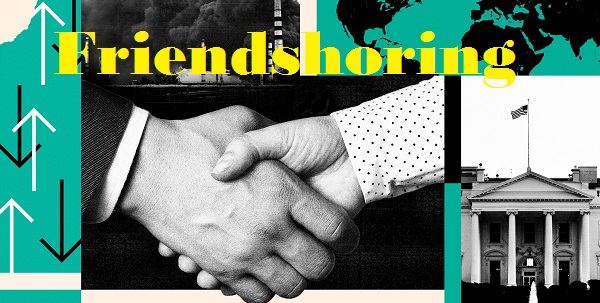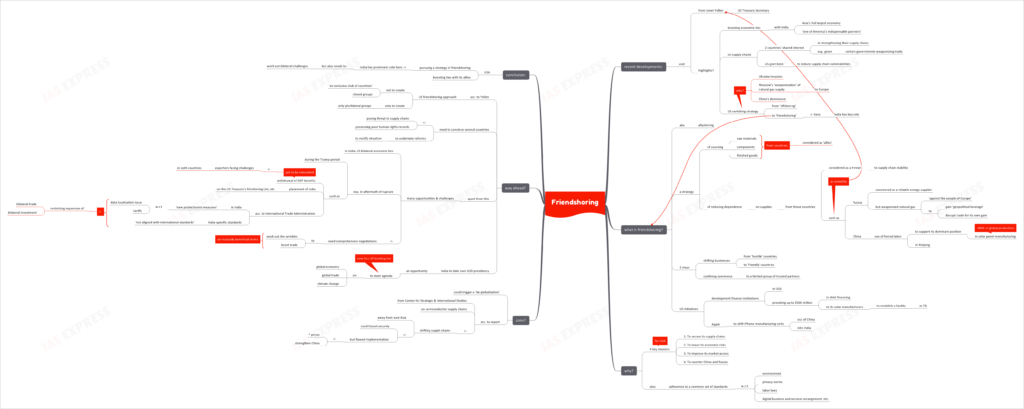Friendshoring- the US Strategy for Stronger Supply Chain

During the recent visit by Janet Yellen, the US Treasury Secretary, India was invited to join USA’s friendshoring strategy, a concept that has been gaining ground since the outbreak of the pandemic and the rising tensions between USA on one side, and China and Russia on the other.

This topic of “Friendshoring- the US Strategy for Stronger Supply Chain” is important from the perspective of the UPSC IAS Examination, which falls under General Studies Portion.
What are the recent developments?
- Recently, the US Treasury Secretary Janet Yellen visited India. She highlighted US’ renewed focus on boosting economic ties with India- Asia’s 3rd largest economy and also, ‘one of America’s indispensable partners’.
- Notably, she highlighted the 2 countries’ shared interest in strengthening their supply chains in the backdrop of certain governments weaponizing trade. She stated that the US government is particularly keen on minimizing its supply chain vulnerabilities.
- In light of the recent disruptions at the global level, the US has been switching from ‘offshoring’ strategy to ‘friendshoring’ strategy. The US Treasury Secretary recently named India as a key element in this plan.
- She cited the Ukraine invasion, Moscow’s ‘weaponization’ of natural gas supply to Europe, China’s dominance in segments like solar panel production, etc. as some of the key reasons for Washington’s eagerness to nurture ties with local partners in developing nations. This will help reduce over-dependence on select suppliers.
What is ‘friendshoring’?
- Friendshoring or allyshoring refers to a strategy of sourcing raw materials, components and finished goods from countries that are considered as ‘allies’. At the same time, the dependence on supplies from those countries considered as a threat to supply chain stability is slowly reduced.
- This time tested business strategy involves 2 key steps:
- Shifting businesses from ‘hostile’ countries to ‘friendly’ countries
- Confining commerce to a limited group of trusted partners
- With regards to the countries considered as threat by the US:
- Yellen mentioned Russia- for a long time considered as a reliable energy supplier, but weaponized natural gas ‘against the people of Europe’, to gain ‘geopolitical leverage’ or to disrupt trade for its own gain.
- She also mentioned China’s use of forced labour to support its dominant position in solar panel production in Xinjiang. Note that China controls more than 80% of solar panel production.
- Yellen highlighted some of the US initiatives under this friendshoring approach:
- US development finance institutions are providing up to $500 million in debt financing to its solar manufacturers to establish a facility in Tamil Nadu.
- Apple has announced plans to shift iPhone manufacturing units out of China, to India.
Why this strategy?
- The US is adopting this strategy for 4 key reasons:
- To secure its supply chains
- To lower its economic risks
- To improve its market access
- To counter China and Russia
- This strategy could enable adherence to a common set of standards with regards to environment, privacy norms, labour laws, digital business and services arrangement, etc.
What are the cons?
- Critics fear that this strategy may push international trade to a more isolated place and reverse the achievements of globalization. In short, it could trigger a ‘de-globalization’ process.
- The Center for Strategic & International Studies, in its July report on semiconductor supply chains, noted that while shifting supply chains away from east Asia could boost security, a flawed implementation of the strategy may increase the prices and consequently, strengthen China further.
What is the way ahead?
- In Yellen’s address, she clarified that the US friendshoring approach wouldn’t create ‘an exclusive club of countries’ i.e. it wouldn’t create closed groups- only plurilateral groups.
- During the visit, Yellen spoke of the need to convince several countries, posing threat to supply chains and possessing poor human rights records, to undertake reforms to rectify the situation.
- Apart from this, Yellen highlighted the opportunities and challenges in India-US bilateral economic ties, especially in the aftermath of rupture during the Trump period (withdrawal of the GSP benefits, placement of India on the US Treasury’s Monitoring List, etc.).
- Note that the US is yet to reinstate the GSP benefits to India. Despite USA being one of India’s largest trading partners, exporters in both countries continue to face challenges.USA’s International Trade Administration commented on India as having ‘new protectionist measures’, especially with regards to the data localization issue, tariffs, etc. and India-specific standards as ‘not aligned with international standards’. The summary noted that this is restricting the expansion of bilateral trade and investment.
- The 2 countries need to hold comprehensive negotiations to work out the wrinkles and boost trade on mutually-beneficial terms.
- In light of India preparing to take over the G20 presidency, New Delhi has an opportunity to steer the agenda on global economy, trade and climate change. Adding to this, the US administration re-affirmed its backing during the recent visit.
Conclusion:
The USA is now pursuing a strategy of friendshoring and boosting ties with its allies. In this strategy, India holds a prominent spot. However, before jumping onto the bandwagon, there is a need to work out bilateral challenges that are impeding the economic ties. For this, dialogue and conclusion of mutually-beneficial agreements is necessary.
Practice Question for Mains:
In light of the global supply chain disruption, the US administration is pursuing a strategy of friendshoring. What are its pros and cons? Should India join this strategy? (250 words)
